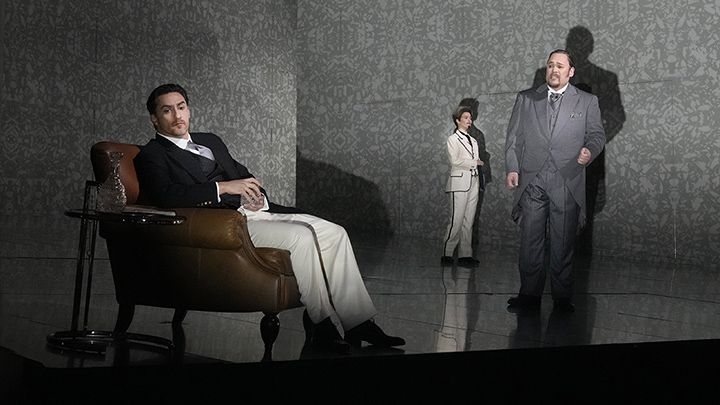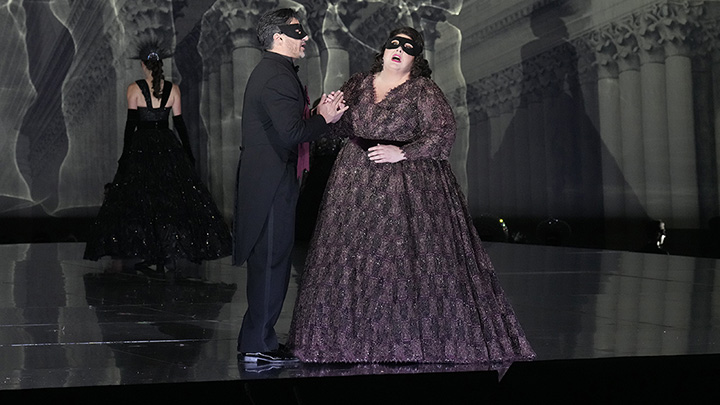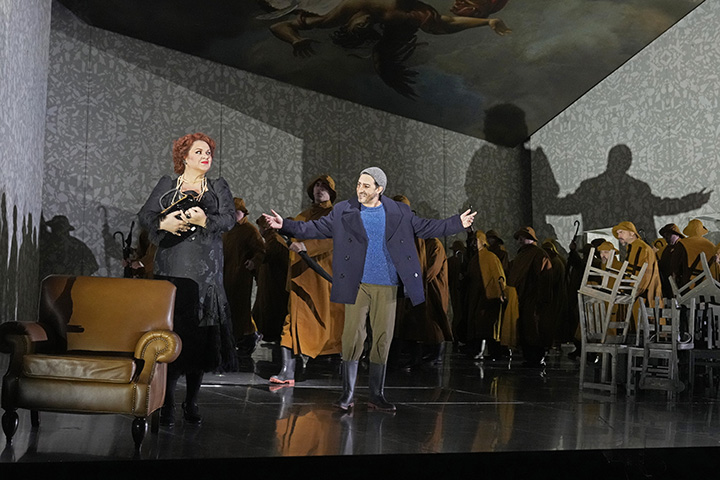The evening was a mixed bag with solid conducting, an uneven cast with a few really strong elements, and a production that so distanced the audience and the performers from the work itself that all their efforts went for nothing.
The Alden production is showing its age in that the direction and choreography has lost whatever precision and intention it originally had and everyone seems to be going through the motions. Alden’s production is set in a Modern Opera Nowhereland vaguely evoking the early 1930’s. Aristocratic hierarchy and privilege were pretty much a thing of the past by then. But the early 20th century is a popular era to reset operas that take place in earlier historical periods. The sets by Paul Steinberg with costumes by Brigitte Reiffenstuel mix stark industrial gray grunge with Cabinet of Dr. Caligari twisted surrealism – we really are never sure where we are. The slanted walls are covered with gray patterned designs, there is a metallic floor, and the ceiling is a huge painted fresco of the falling Icarus, the ill-fated Greek who flew too close to the sun on waxen wings. The fate of Icarus seems to be related to our protagonist King Gustav III of Sweden, but how this ruler overreaches or is a victim of his own hubris isn’t really made clear. Also, the original production had a prologue with Gustavo seeming to fall asleep in an armchair and dreaming all the stylized and incoherent stage action – that wasn’t as clear here. What we never get a sense of is of a real environment where the events of this drama might plausibly happen – it’s all effects without causes or interrelationships.
Meanwhile, the stage is filled with dancing waiters holding stacks of champagne glasses, chorus members clutching purses or umbrellas and moving in unison like suburban zombies, hands reaching out from under the stage when Amelia is supposed to be alone on the heath, etc. You are constantly distracted and asking “Why?”. Several moments where strong singers had solo moments alone onstage with no regietheater bells and whistles scored – notably in Act III Scene 1 where Quinn Kelsey as Renato held the audience in the palm of his hand during “Eri tu” and Angela Meade as Amelia limned a radiantly sorrowful “Morrò, ma prima in grazia.” Both arias got a rapturous audience response. For a moment, the music revealed the characters which connected with the singers and the singers connected to the audience with no distancing Verfremmdungseffekt.
Un Ballo in Maschera is full of contrasting tones and moods – Verdi uses “chiaro” elements of French opéra-comique in his depiction of the brilliant gaiety of the Swedish court in contrast with the Verdian dramatic “scuro” of the forbidden romance, dark conspiracies, and vengeful betrayals of the melodramatic story. Some characters live in one world – the page boy Oscar, a travesti soubrette coloratura is pure comic French operetta while Amelia and Renato occupy a world that is strictly Verdian and tragic. Our hero Gustavo ping pongs between the comic and dramatic worlds often laughing ironically at his own fears or passions i.e. “É scherzo od é follia” in Act I. (Verdi’s libretto is taken from a French grand opera Gustave III, ou Le Bal Masquéwhich premiered in Paris in 1833 with a libretto by Scribe and music by Auber).
Alden’s consistently artificial and overtly stylized action seems to be mocking and undercutting both the comic and tragic elements. For example, in Act II’s steamy love duet, Amelia and Gustavo remain on opposite sides of the stage. At the passionate climax with Amelia’s confession of love, the ceiling fresco of Icarus lifts and the back walls divide to show a desolate landscape of bare trees and gray sky. This stark vista is then covered over again when Renato shows up to warn Gustavo that he is about to be discovered with a veiled unknown woman. Logically wouldn’t we need to start the scene with the desolate landscape and have the painting of the overreaching Icarus come in as the would-be lovers are lost in their own world of unreachable dreams? Constantly what we saw undercut what we were hearing and the reality of the situation. An audience member with no knowledge of the libretto would not know what, if anything, was going on. Or care.
The 2012 premiere of this production had charismatic and vocally apt singers like Marcelo Álvarez, Sondra Radvanovsky, Dolora Zajick and Dmitri Hvorostovsky to anchor the drama. A 2015 revival benefited from the presence of Piotr Beczala and Stephanie Blythe while Radvanovsky and Hvorostovsky remained constant.
What Ballo really needs is a star tenor (my first was Luciano Pavarotti in one of his best roles) and that was not present this time around. Charles Castronovo as King Gustavo has a light lyric tenor that has darkened with maturity resulting in a covered grainy timbre which hasn’t gained in real tonal breadth or brilliance. It was a rather opaque sound that lacked expansion in the middle and brilliance in the upper third. He seemed miniature vocally and physically next to Meade and Kelsey. On the other hand, the totally professional and experienced Castronovo is an elegant trim figure who moves well onstage and acts with alertness. He is a stylish and smart musician. He didn’t drop the ball but he wasn’t the glittering belle of the ball either. He was just kind of there – a guest at his own party.
Angela Meade as Amelia seemed unsettled and finding her way into the role and production (she was a replacement for the expecting Elena Stikhina). The basic sound is womanly and sympathetic and large enough for this role in this house but nerves seemed to plague her in difficult sections. This resulted in an initially uneven performance highlighting some of her less attractive vocal qualities. In her introductory scene in Act I in the trio with Ulrica and Gustavo, Meade opted to take her phrase “Ah, consentimi o Signore” in a tiny cupo piano tone rather than letting it soar over the other voices. The enveloping phrase contracted rather than expanded over the orchestra and other singers.
The rangy and dramatic Act II scena “Ecco l’orrido campo…Ma dall’arido stelo divulsa” and the ensuing duet “Teco io sto” had her gunning and lunging for notes when things got tough on exposed high notes and declamatory phrases, resulting in her warm full tones turning shallow with a jittery vibrato. By Act III, Meade settled into a groove and ended the evening impressively – her “Morrò, ma prima in grazia” was the highlight of the evening for her and the audience. She did many lovely things in her final duet with Gustavo and the final ensemble. I think future performances will come together more consistently and satisfyingly for Meade, she is a hard worker who is always striving.
Quinn Kelsey, fresh off a successful debut in the title role of Simon Boccanegra at Philadelphia Opera last month, added another great Verdi baritone role to his Metropolitan gallery with the wronged and vengeful husband Renato. His tone is impressive and rich, the vocal weight and bulk imposing, the upper register secure. Kelsey had vocal authority and presence in spades but I found him somewhat lacking in Verdi style and often too blunt in his phrasing. Though he murders the opera’s hero, Renato does not start out the story as a villain but a sympathetic, loving friend and husband. Kelsey’s opening aria “Alla vita che t’arride” displayed angular phrasing and stiff contours in what should be the warm, cantabile plea of a loyal friend warning his royal friend that his life is in danger and that others depend on him. Warmer Italianate vowels and rounder legato phrases would have assisted here. Throughout, Kelsey’s Renato sounded too aggressive and angry until Act III where the aggression and anger were apt to the dramatic context and character. From there on it was all of a piece.
I was again very impressed with the Russian mezzo-soprano Olesya Petrova as the fortuneteller Ulrica after her excellently sung Amneris last season. The tone was warm, enveloping and richly plangent while she managed the wide range from contralto depths to high mezzo tops without any ungainly gear shifting or register breaks. This was a musical, authoritative and confident traversal of the role.
Also making a pleasing impression was the debutante coloratura soprano Liv Redpath as a petite, mustachioed and goateed Oscar. Redpath’s tone has no soubrette squeakiness or narrow hardness but is all glowing soft-edged radiance and fresh warmth. Her soaring line over the “É scherzo od é follia” ensemble gave pleasure with her poised, effulgent tone. Only her teasing last act aria “Saper vorreste” lost some brilliance because she was too legato, not pointing up the staccati with rhythmic attack and precision. Despite the unflattering costume and make up and the silly stage business she was obliged to execute, Redpath made a fine impression and would be lovely in roles like Sophie in Werther that used to be done by Lisette Oropesabefore she ascended to prima donna status.
Conductor Carlo Rizzi knew his business in the pit and went about it, there were some dodgy bits of ensemble but he pulled things together. Whatever was happening onstage, he kept the show moving – not inspiring but reassuringly solid.
I think a new production (hopefully with Quinn Kelsey and Lise Davidsen as Amelia) is needed. But only if a star tenor emerges for the role of Gustavo – maybe Freddie De Tommaso or Jonathan Tetelman? Has Italy stopped creating star tenors? Lend us a tenor, Lord!
Photos: Ken Howard





